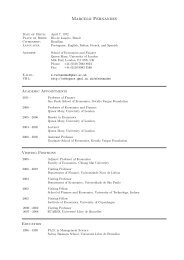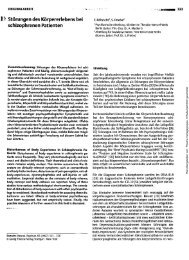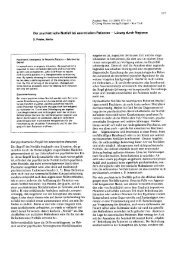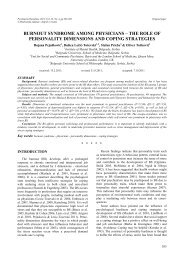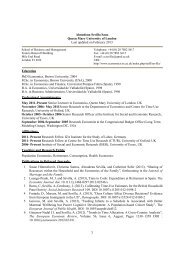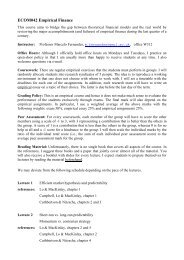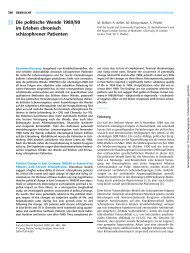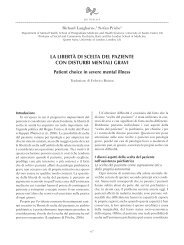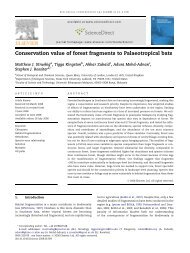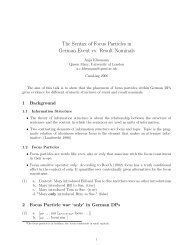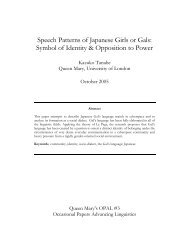Proofs - Personal Webspace for QMUL - Queen Mary, University of ...
Proofs - Personal Webspace for QMUL - Queen Mary, University of ...
Proofs - Personal Webspace for QMUL - Queen Mary, University of ...
You also want an ePaper? Increase the reach of your titles
YUMPU automatically turns print PDFs into web optimized ePapers that Google loves.
S36 A. Heinz et al. / European Psychiatry 27 (2012) / supplement n°2 / S32-S43<br />
to describe the phenomenon <strong>of</strong> self consciousness, they already<br />
presupposed a kind <strong>of</strong> primary awareness or knowledge <strong>of</strong> myself<br />
but wrongly suggested that this self- knowledge is a secondary<br />
result <strong>of</strong> refl exivity. There<strong>for</strong>e, the primary relation to myself<br />
is no propositional knowledge, i.e. it cannot be compared with<br />
factual knowledge given as a narrative self- description, e.g. that<br />
“I know that I was born in a certain city”. The second “I” in this<br />
sentence does not appear to be problematic – I know something<br />
about myself, just as I can know something about the weather (<strong>for</strong><br />
example that “it rains”). The expression “I was born in a certain<br />
city” represents propositional knowledge about a fact, in this case<br />
resulting from a refl ection about myself (my birthplace). But how<br />
do I know who this “I” actually refers to? How do I know that I<br />
am identical with the fi rst “I”, the “I” in the part <strong>of</strong> the sentence<br />
which states that “I know something” (in this case something<br />
about myself)? Frank’s solution, adopting essentially Fichte’s<br />
reaction to Kant’s circularity problem, is the suggestion that the<br />
fi rst “I” in the sentence referred above represents no propositional<br />
knowledge, because it does not result from a refl ection about<br />
any perceivable quality <strong>of</strong> this ego, which can be discussed in<br />
discourse. Instead, my experience <strong>of</strong> myself is a direct awareness,<br />
which precedes any “self- refl ective knowledge”. Frank went on<br />
to suggest that the status <strong>of</strong> this kind <strong>of</strong> self- awareness could<br />
be called prerefl ective or non- objectual – as it consists in an<br />
acquaintance which comes about without objectifying its content.<br />
This idea is illustrated by Hector- Neri Castañeda’s argument that<br />
“there is no object <strong>of</strong> experience that one could perceive as the<br />
self that is doing the perceiving. … whenever one does [identify<br />
an object <strong>of</strong> experience with oneself], one identifi es an object<br />
in experience with a thing which is not part <strong>of</strong> the experience,<br />
and this thing is the one which the person in question will refer<br />
to by I” [5]. Likewise, Shoemaker argued that “the reason one is<br />
not presented to oneself ‘as an object’ in self- awareness is that<br />
self- awareness is not perceptual awareness, i.e. is not the sort <strong>of</strong><br />
awareness in which objects are presented. It is awareness <strong>of</strong> facts<br />
unmediated by awareness <strong>of</strong> objects” [55, p. 104- 5].<br />
In case we accept that such a prerefl ective awareness, a<br />
kind <strong>of</strong> intimate knowledge or feeling about one’s own self, is a<br />
common experience at least in the European tradition, several<br />
questions arise. First, is this phenomenon a fundamental principle<br />
<strong>of</strong> self awareness and can it thus be found in non- Western<br />
cultures with quite different concepts <strong>of</strong> the self? Secondly, can<br />
it be lost or fundamentally altered in cases <strong>of</strong> “ego disorders”<br />
such as thought insertion or depersonalisation? And thirdly, how<br />
does the refl ective concept <strong>of</strong> a person arise – even if we agree<br />
with Frank and Henrich that a prerefl ective self awareness is a<br />
fundamental aspect <strong>of</strong> human experience?<br />
The fi rst question will be discussed in more detail below.<br />
With the respect to the second question, we suggest to distinguish<br />
between prerefl ective core- subjectivity and a (“selfrefl<br />
ective”) <strong>for</strong>m <strong>of</strong> personal narration or self- interpretation,<br />
in which a subject ascribes certain qualities to its own self.<br />
Core- consciousness must be conceived <strong>of</strong> as not entertaining<br />
an explicit relation to a so- called ‘self’or ‘consciousness itself’as<br />
insinuated by talk <strong>of</strong> ‘inward- glance’, ‘inner- monitoring’ or ‘selfrepresentation’.<br />
All such models favour a distorted duplication<br />
<strong>of</strong> core- subjectivity. ‘To represent’ is a two- place verb; what we<br />
mean by ‘self- awareness’ or ‘selfhood’cannot be dual. It has <strong>of</strong>ten<br />
been declared that ‘being’ and ‘being- appeared- to- a- subject’ are<br />
entirely coincident and leave no space <strong>for</strong> countable/numerical<br />
difference (e.g. Shoemaker [55]). This is why ‘representation’<br />
is in appropriate as a basic term <strong>for</strong> a theory <strong>of</strong> consciousness<br />
and self- consciousness, since it is poised to invite conceptual<br />
confusion <strong>of</strong> pre- refl ective self- awareness with concept- based<br />
(and there<strong>for</strong>e fallible) self- interpretation. Were our primordial<br />
self- access interpretation- based (and hence theory- laden), there<br />
would be no space <strong>for</strong> a divide between standard and altered<br />
ways <strong>of</strong> self- apperception. Self- consciousness would, in principle,<br />
be fallible with regard to determination <strong>of</strong> its own content<br />
– and there<strong>for</strong>e no more distinguishable from self- alienation,<br />
de- personalisation or other mental disimpairments.<br />
Irrefl exivity is the crucial point <strong>of</strong> the stressed certainty concerning<br />
the cogito; this is so from Descartes through Brentano<br />
and Chisholm down to Horgan and Kriegel [10, 26]. This certainty<br />
may not be infallible but it is beyond reasonable doubt. Still post<br />
festum de<strong>for</strong>mation can overlay or distort the starting state in<br />
mental disorders. Some authors suggest that such distortions<br />
can appear at least <strong>for</strong> moments and even impair pre-refl ective<br />
self-awareness, causing e.g. the experience <strong>of</strong> alien thought<br />
insertion [53]. However, if pre-refl ective self-awareness is<br />
temporally eclipsed, how then does the person know that these<br />
are alien thoughts in his/her mind? And if only pre-refl ective<br />
self-awareness is eclipsed with respect to this one thoughtwhy<br />
is it at all experienced as a thought and not as an external<br />
event? There<strong>for</strong>e, de<strong>for</strong>mation in self-apperception may rather<br />
be caused by refl ective, conceptual misinterpretations <strong>of</strong> the<br />
grounding mental states or events or by misunderstandings<br />
concerning the agent or owner <strong>of</strong> those states. They are due to<br />
conceptual work.<br />
The third question has been addressed by Honneth, who<br />
suggested that respect and appreciation (Anerkennung) <strong>of</strong> other<br />
persons and <strong>of</strong> myself is a prerequisite <strong>for</strong> human communication<br />
[25]. Honneth distinguishes three social <strong>for</strong>ms <strong>of</strong> mutual<br />
respect: love, justice and solidarity. While love is seen as an<br />
individual relationship which fosters e.g. specifi c qualities <strong>of</strong> a<br />
developing human being, justice guarantees the fundamental<br />
equality <strong>of</strong> all humans and solidarity appreciates individual differences<br />
in each subject’s contribution to society [25]. In case these<br />
<strong>for</strong>ms <strong>of</strong> respect are violated, confl icts can result as evidenced e.g.<br />
by the Civil Rights Movement <strong>of</strong> African Americans in the 1950s<br />
and 60s. On the other hand, the positive experience <strong>of</strong> these <strong>for</strong>ms<br />
<strong>of</strong> respect allows the individual to identify with the qualities that<br />
were appreciated in these <strong>for</strong>ms <strong>of</strong> social contact. Refl ective selfconsciousness<br />
thus constructs a narration or “picture <strong>of</strong> myself”<br />
that is already <strong>for</strong>med by social interaction. There<strong>for</strong>e it is plausible<br />
to assume that both biological (e.g. stress) factors and social <strong>for</strong>ms<br />
<strong>of</strong> disrespect can interfere with essential aspects <strong>of</strong> the self- image<br />
<strong>of</strong> a human being and may result in depersonalisation. The person<br />
may thus no longer be able to identify with her desires or feelings,<br />
e.g. when social rejection <strong>for</strong>ces her to suppress the emotions<br />
and thoughts and thus limit her ability to be in direct contact<br />
with her desires and with the world at which they are directed<br />
(derealisation, which <strong>of</strong>ten co- occurs with depersonalisation).<br />
Indeed, the symptom <strong>of</strong> depersonalisation is neuro- biologically<br />
unspecifi c and can be found after psychosocial trauma as well<br />
as in deliria, neurotic or psychotic disorders. Particularly in dissociative<br />
disorders, cultural factors can shape this specifi c <strong>for</strong>m<br />
<strong>of</strong> experience as discussed below.<br />
<strong>Pro<strong>of</strong>s</strong>



